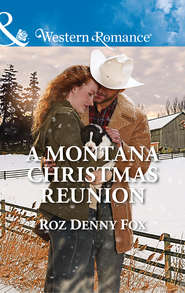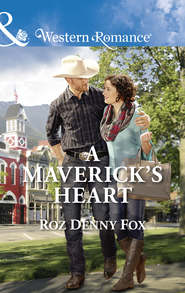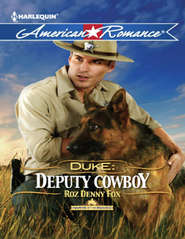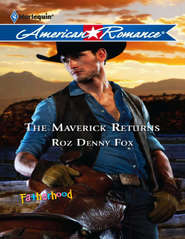По всем вопросам обращайтесь на: info@litportal.ru
(©) 2003-2024.
✖
Daddy's Little Matchmaker
Автор
Год написания книги
2019
Настройки чтения
Размер шрифта
Высота строк
Поля
Refilling her cup, Laurel called Dog. The two of them went out to enjoy the sun warming the front porch. Here, and in the upper cottage where she did her weaving, the past always faded into obscurity.
A row of window boxes on the porch spilled over with violets and fragrant pinks. Their perfume filled the air with the promise of spring. Winter rains had subsided, and the creek had once again receded below its banks. Laurel loved everything about the cottages, including the fact that no one could drive up and surprise her. A footbridge crossed the creek. Visitors had to park in a clearing on the other side—not that she had any visitors.
Laurel also owned two horses she’d bought about the time she adopted Dog. That was because her grandmother had once written about how she carried on the laudable work begun by another Kentucky weaver. Lou Tate Bousman had devoted her latter years to keeping the art of hand-weaving alive. Both women, during different decades, had traveled the hollows of the Kentucky hill country, collecting and preserving patterns that would otherwise have been lost.
As she went back inside, Laurel reflected on her efforts to carry on the tradition. Last fall, she and Dog had roamed those same hills, she on horseback, he loping beside her. Laurel had met some fantastically talented women, although uneducated by most standards. The beauty of the hollows, and the strength of women who survived under mostly primitive conditions, had helped heal Laurel’s shattered life.
Sort of. She and Dog both tensed at hearing a car heading toward the clearing.
Actually, it was a panel van. Squinting through an ivy-covered lattice that framed one end of the screened porch, Laurel made out the lettering on the side: Saxon’s Flower Shop. Was the driver lost? Unless Dennis had suddenly gotten flush again… But his flush times were growing fewer and further between, and his ability to bounce from job to job lessening. Besides, he’d never waste money on flowers.
A chubby woman with flame-red hair piled high atop her head crawled out of the vehicle. “Hello, the house,” she called. “I have a delivery for Laurel Ashline. Am I in the right place?”
Dog sensed Laurel’s uneasiness. He barked and lunged at the screen door. Silencing him with a word, Laurel ordered him to stay as she stepped outside. Tightening the sash on her robe, she walked to her side of the bridge. How should she respond? She’d never received a flower delivery before. Never. Would the driver expect a tip? Nervously, Laurel smoothed a hand over her shoulder-length, wheat-blond hair. Goodness, she must look a fright, judging by the scrutiny she was getting.
The driver, puffing a bit, crossed the rickety bridge. She lugged a wicker basket wrapped in cellophane.
Wryly, Laurel saw she still wasn’t getting flowers, but rather a fruit basket the woman plopped at her feet.
“Thank you,” Laurel said softly. “I’m sorry to greet you in my robe. I worked all night on a weaving I need to deliver for a bridal shower today. Are, uh, you positive this is mine?”
Bending, the woman unpinned the attached card. “I’m Eva Saxon, owner of the flower shop in Ridge City. If you’re Laurel Ashline, it’s yours.” Eva slid the card out of the envelope and held it up for her to read. “Came from Alan Ridge himself, I’m told—which makes you special. Alan keeps to home these days. Has since his wife died last year in a car crash. Emily was a beauty, she was. A born prom queen. ’Course, she was a lot younger than me. You’re a lucky woman.” Eva nodded sagely. “Alan Ridge is a good catch.”
Laurel stiffened. “I’m sure he is, should a woman be fishing for a man. I am not,” she said loudly. So loudly that Dog began to bark again, throwing himself against the screen. Laurel worried that he’d get hurt or come through the mesh. “Excuse me, my dog is very protective. Thank you again for the delivery. Really, it’s not personal. Mr. Ridge contacted me regarding business. Very early in the morning. It’s totally unnecessary, but he probably sent this by way of an apology for waking me.”
The shorter woman under the mountain of hair nodded as if she understood. As Laurel turned and left the bridge, she, too, retreated.
Once the van had driven off, Laurel let Dog out. He continued to growl so she let him sniff the basket filled with rare fruit—mangos, guavas, pineapples and grapes. Laurel let the van’s dust settle, then marched across the bridge to where she had to keep her garbage can if she wanted the city to empty it. Collectors wouldn’t come until Friday, and it was only Wednesday. Her receptacle was full. Nevertheless, because she didn’t wish to accept anything from a man who made his money off whiskey, she jammed the basket as far into the can as possible. As a result, she had to hang the lid sideways on the basket handle.
“Come, Dog. With luck, that’s the last we’ll hear from Mr. Ridge.”
IT WAS THREE DAYS before Alan made it into town. He had to run by the elementary school to pick up the quarterly lesson packets that Louemma’s tutor used. They’d tried having his daughter attend classes after she’d healed from the initial surgeries, but she’d gotten so upset that in the end he’d decided to have her taught at home—for a while, anyway.
From there, he stopped to pick up groceries for Birdie. He dragged out the trip because he wanted to avoid hearing Vestal fuss at him to apologize to the Ashline woman.
As well as that aggravation, Hardy Duff, his distillery manager, had been pressuring Alan to do something about Bell Hill. So he swung by the courthouse to have a clerk trace its history—to figure out how they’d lost what had once been part and parcel of Ridge land. Everything seemed to be in order, up to when Hazel filed squatter’s rights. Alan didn’t know what else to do. He’d left a note to that effect in Dale Patton’s office, even though Dale, the company attorney, was on vacation.
Following that, Alan decided to get his hair cut prior to moseying over to Saxon’s Flowers. Finally, when he hit the very end of his to-do list, the only thing left was to order a damn bouquet for the disagreeable Ms. Ashline.
Even worse, Eva Saxon was like the town crier. Alan suspected that seconds after he walked out of her shop, everyone in town would know he’d sent a strange woman flowers. As he approached the store, he had a brilliant idea. He’d send a bouquet in Vestal’s name.
Eva Saxon, nearly as wide as she was tall, glanced up as the bell over the door sounded. She was ten years older than Alan’s thirty, and used to baby-sit him. Smiling, she greeted him with the snap-snap-snap of her ever-present Cloves gum.
“Hi.” Alan fumbled Laurel Ashline’s wrinkled business card out of his jeans pocket, along with a fifty-dollar bill. “This is all the information my grandmother has on the woman. She said you shouldn’t have any problem finding her and delivering a plant or something. Enclose a note saying that Vestal invites Ms. Ashline to drop by Windridge at her convenience, or something to that effect. Oh, you’d better include our address. I believe she’s new in town.” He shoved the money across the counter.
Eva dug a pencil out of her beehive hairdo. For as long as Alan could remember, she’d worn her hair in the exact same style, and yet it still astonished him. As he gaped at her big hair, he noticed Eva eyeing him oddly. “Is something wrong?”
Crack went the gum. “Uh, no. ’Cept Vestal phoned a few days ago and ordered a deluxe basket of fruit sent to Ms. Ashline on your behalf. I helped her compose a real sincere apology. If you haven’t heard back by now, hon, I’ve gotta say you must’ve really done the lady wrong.” She stuffed the fifty in her cash register and counted out change. “The basket cost twenty-five dollars.”
“What?” Alan saw red, and it wasn’t just Eva’s hair color.
“I suggested a dozen roses instead of fruit. Or a box of chocolates displayed prominently on top of the fruit. Vestal nixed both.” Eva shoved Alan’s change toward him. “It’s probably not too late for roses. ’Course, I don’t know what you did to the woman. But I got some nice pink buds in today. Shall I carry Laurel out a dozen this afternoon? Is she worth another twenty-five bucks?” Eva kept a hand on the last bill.
“I haven’t got the foggiest idea what she’s worth. I’ve never met her.” Alan wadded up the change and stuffed it in his pants pocket. He retrieved Laurel’s business card, then started for the door. Then he hesitated and pivoted back. “Hell, Eva, stick a few of those roses in a nice vase. Write her address on the back of this card. I’ll deliver the flowers myself.”
“Uh-huh. You made her mad, but you don’t even know where she lives?” Reaching into the cooler that sat behind the counter, she hauled out an already made up arrangement. “That’ll be six ninety-five. A bargain, even for self-delivery. These buds are beauties. Out of curiosity, what did you do to the lady that requires flowers?”
Alan flung down a ten, muttering, “Keep the change.” He snatched up the vase. “For the record, I never have met Ms. Ashline, so don’t be spreading rumors, okay?”
The pale blue eyes regarded him frostily. “But Vestal said—”
“Yes, she’s got a bee in her bonnet. This need for me to apologize is due to a mess of Grandmother’s creation. I’m caught in the middle. You know Vestal’s been ill? Ms. Ashline’s someone she met at the hospital.”
Eva frowned slightly. “Vestal didn’t sound dotty. But I s’pose she is gettin’ on in years. Ralph’s mama’s not as old as your grandma, and that woman’s plumb gone off the deep end.” Launching a diatribe against her mother-in-law, Eva followed Alan to the door.
“Thanks,” he said, all but running from the shop. Alan didn’t stop to study the address until he was in the Jeep and had the motor running. Then his jaw dropped.
Laurel Ashline lived in Hazel Bell’s old cottage. The first of two tucked deep in a grove of sycamore and red maple trees—a scant few miles from the source of the spring gushing down Bell Hill. That spring was at the core of Alan’s current problem. Hardy Duff insisted they had to tap into it in order to expand Windridge; he wanted to add a hundred new mash barrels per each milling process.
Alan was well aware that the water they used, rich with essential minerals and naturally filtered through Kentucky limestone, made Windridge bourbon one of the most sought-after whiskeys in the world. What he didn’t know was how Laurel Ashline had ended up living next to a coveted stream that really belonged to him and his family.
Alan might not know, but he intended to find out. With or without an offering of fruit or roses, he thought, wedging the vase between the passenger seat and his center console.
He fumed to himself all the way from town, taking a shortcut fire road that bisected his property from the Bells’ land. What they claimed was their land. He made the mental correction as he got out to open a gate posted with a Private Property—Keep Out sign. For the first time, he wondered if his grandmother knew the Ashline woman had settled in quarters they owned. Well, maybe owned. He revised that thought, too. According to the clerk he’d spoken with earlier, Hazel Bell hadn’t done anything illegal.
Hazel and Ted had met the state statute for filing squatter’s rights. Jason Ridge, Alan’s grandfather, had issued a temporary deed, which gave Ted the right to erect two dwellings. The couple had resided in one cottage long enough to qualify them as land claimants, otherwise known as squatters, according to a historic act that had apparently never been removed from the county statutes. Such folks had the right to petition for ownership of land they’d improved and occupied for twenty years. Clearly, no Ridge had suspected the Bells would ever file.
Alan didn’t understand all the legal mumbo jumbo. And Windridge’s business attorney was in Europe on vacation. There was little Alan could do until Dale Patton returned. Except…he could determine who’d let Laurel Ashline move in. Hazel had been dead and buried for over a year. Alan could attest to that, as he and Vestal had attended her funeral. It was then that they’d learned of her treachery. Hazel’s lawyer, an upstart from Lexington, had paid her outstanding bills and practically thumbed his nose at locals over the squatting.
Now Alan wracked his brain and tried to recall who else had been at the service. A van filled with mostly middle-aged women had shown up at the last minute, making a total of maybe fifteen. Sad for someone who’d lived her entire life in Ridge City. But as Vestal had pointed out, Hazel had cut herself off from neighbors.
Alan supposed Laurel Ashline must’ve been in the van. He knew Hazel was involved in local craft fairs. Ted had complained often enough that his wife spent more time with her “artsy-fartsy friends” than she did at home doing what he figured wives should do. Alan guessed that meant cooking, cleaning and the like.
He never commiserated, because he didn’t share Ted’s belief, and because his wife had acted in a similar fashion. Not that Emily ran with an arts crowd. She’d spent her days—and nights—with the horsey set. Racehorses. Down in Louisville. Alan had rarely seen her during the months leading up to the Kentucky Derby. But race season was long over when Emily had had her accident, which was why Alan had such a hard time understanding why she’d been on that particular road. He knew what people whispered, though.
Even now his stomach pitched at the memory of the call from the state police. He forced his mind onto other subjects. Such as what questions he ought to ask when he arrived at Laurel Ashline’s door—about two minutes from now.
Pulling up, Alan parked on the west side of the stream near the footbridge leading to the largest of the Bell cottages. Ted had built the second, smaller place for Hazel’s crafts. Down-home items sold like hotcakes to summer tourists.
If he’d hoped to find the structures in major disrepair, he was sadly disappointed. The oiled-wood siding on both buildings looked to be in pristine shape. Slate-blue trim gleamed as if newly painted. All around the cottage, a profusion of crocuses and daffodils created a riot of color against the bright green of trees just beginning to burst with spring leaves.
Absently, Alan reached back to retrieve the vase with its pale-pink rosebuds. They seemed puny compared to the Ashline woman’s garden.
Not for the first time, Alan considered forgetting about this stupid mission. Except, it had never been said of Ridge men that they were cowardly. Hitching up the belt of his well-worn jeans, he thrust a hand through his freshly cut hair, which still bore a cowlick. Alan slammed the Jeep door and set out across the footbridge. He’d taken two steps onto the spongy wooden slats when a huge, snarling dog flew from around the left corner of the cottage, running straight at him. Black ears laid flat spoke of the animal’s displeasure at seeing a stranger. A second look at the black muzzle, lips curled over gleaming white incisors, had Alan edging back the way he’d come.
He tried softly cajoling, muttering, “Good dog,” several times, to no avail. After which he resorted to shouting for the dog’s owner. “Ms. Ashline! Laurel? Hey, could you come out and call off your watchdog?”
He got no response. But Alan would swear the white lace curtains covering the largest window moved. And wasn’t that the shadow of a human form appearing briefly behind a rip in the lace?











